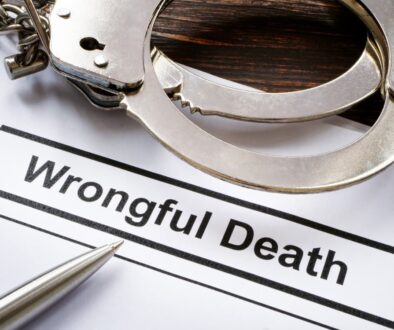Proving a Wrongful Death: Key Requirements and Legal Elements
In the intricate tapestry of life, a sudden death in the family can unravel everything we hold dear. The unexpected loss of a family member sends shockwaves through your world, leaving you grasping for meaning in chaos.
But when this heart-wrenching tragedy results from someone else’s carelessness or recklessness, feelings of rage and injustice surge, intensifying the storm of grief that engulfs everyone you love.
Amid profound sorrow, there’s a glimmer of hope, a way to channel your pain into something meaningful. While it can never mend the shattered pieces of your heart or bring back your loved one, it is a path to justice. Your family can embark on a journey towards accountability and financial restitution through a wrongful death lawsuit.
This legal pursuit is not just about financial gain but also about holding those responsible for your loved one’s passing accountable for their actions. It’s about demanding recognition that your family’s world has been changed forever due to the negligence of another.
In the face of unimaginable loss, this is a chance to stand against the forces that brought you to this point, to demand that your loved one’s memory be honored through justice.
An experienced Tulsa wrongful death lawyer will know how to maneuver the legal system and get your family the compensation and justice you deserve.
Wrongful Death in Oklahoma

According to Oklahoma law, if someone dies because of someone else’s mistake or negligence, a person chosen to represent the deceased can file a personal injury lawsuit to hold the responsible party accountable for what happened.
What would usually be a personal injury case turns into a wrongful death lawsuit when the person injured dies because of the incident. In wrongful death cases, the person representing the deceased, usually a family member, can take legal action against the responsible party. Wrongful death can result from negligence, intentional harm, or medical mistakes.
This legal action is pursued in civil court, and if it’s successful, the person at fault must pay compensation for both financial and emotional losses to the deceased person’s estate and their surviving family members, such as the spouse, children, and parents, to help them cope with their grief and the loss of companionship.
Oklahoma’s wrongful death statute states that the damages payable to the survivors include:
- Medical expenses.
- Burial costs.
- The spouse’s grief and loss of consortium.
- The emotional pain and anguish of the decedent before they died.
- The children’s and parent’s grief and loss of companionship.
- The monetary losses of the survivors resulting from the wrongful death.
- The death of an unborn person is included in wrongful death claims.
Sometimes, the survivors might be entitled to punitive or exemplary damages to punish the offender for inexcusable conduct.
The family members may testify to their grief, loss of consortium, and loss of companionship.
An experienced wrongful death attorney can pursue the compensation the family needs to heal.
What Evidence Will a Wrongful Death Case Require?
Your case may require proof of the victim’s:
- Occupation and earning capacity.
- Accident reports, police reports, and witness statements.
- Medical bills.
- Burial costs.
- Death certificate.
- Health and medical history.
- Medical examiner records.
- Mental pain and anguish suffered before death.
You’ll also need proof of the effect of economic and noneconomic damages on the survivors, such as:
- Loss of companionship or consortium
- Mental pain and anguish
- Grief
- Losses due to the victim’s earning potential
You don’t have to go through this by yourself. Your attorney will help you collect the required evidence and guide you through a wrongful death lawsuit.
How Do You Determine Pecuniary Loss in a Wrongful Death Case?
Financial professionals with expertise in analyzing death cases figure the monetary losses.
Oklahoma considers the following elements in determining the economic losses:
- The victims’ age and life expectancy.
- The victim’s occupation and earning capacity.
- The health of the victim before the accident.
In most cases, when it’s not explicitly stated in the law, the judge determines how the financial losses are distributed among the survivors.
How to Prove Negligence in a Wrongful Death Case?
Your lawyer must prove the following legal elements for a successful wrongful death suit:
- Duty of care: The accused was obligated to ensure the victim’s well-being. For instance, individuals operating vehicles must drive safely and cautiously. Likewise, healthcare practitioners must preserve the health of their patients.
- Breach of duty: The accused displayed negligence and violated their obligation to the victim. For instance, a driver disregarded a red traffic signal, or a doctor made an incorrect diagnosis.
- Causation: The breach of duty led to the victim’s death. Your lawyer will work with eyewitnesses, investigators, industry professionals, traffic reconstruction experts, and physicians to prove the incident caused the victim’s death.
- Damages: The victim’s death resulted in losses. Your lawyer will provide the proof that supports the damages you seek and build your case’s strength.
Does Oklahoma cap wrongful death damages?
Oklahoma does not limit damages.
How Are Wrongful Death Funds Issued in Oklahoma?
The defendant’s insurance company will cover the awarded damages. Initial disbursement will pay the plaintiff’s legal fees, with the remaining balance directed to either the plaintiff or the victim’s estate. Recipients will not typically need to pay income, estate, and inheritance taxes for wrongful death settlements.
Who Can File an Oklahoma Wrongful Death Lawsuit?
The deceased’s loved ones can initiate a wrongful death lawsuit in many states, but in Oklahoma, the law says that the personal representative, or executor, of the deceased individual’s estate must bring a wrongful death claim in court. The personal representative stands for the deceased and the beneficiaries or heirs.
When someone dies, their will may choose someone to handle their affairs. If they didn’t choose anyone or the chosen person can’t or won’t do it, the court can pick someone to do the job.
Is There a Statute of Limitations For a Wrongful Death Claim in Oklahoma?
In Oklahoma, plaintiffs must file a wrongful death case within two years of the person’s death, as mandated by the statute of limitations. Failing to do so may result in the court refusing to hear it.
A statute of limitations is a rule that establishes a time limit for starting legal actions after someone claims wrongdoing in a civil or criminal case.
The specific term allowed for a victim to pursue legal recourse against the alleged wrongdoer may fluctuate depending on the jurisdiction and the type of offense in question.
If you’re considering a wrongful death lawsuit in Oklahoma, consult a local personal injury attorney. A lawyer can explain how the law applies to your circumstances.
What Damages Can I Recover in an Oklahoma Wrongful Death Claim?
Oklahoma wrongful death claims operate on the same legal principles as other personal injury cases.
They typically involve seeking two main categories of compensation:
- Compensatory damages: This type of compensation covers various losses stemming from the wrongful death, such as medical expenses, funeral costs, loss of companionship, grief, and the financial support the deceased person provided.
- Punitive damages: These damages are not meant to compensate the victim’s family but to penalize the defendant for their wrongdoings and discourage others from engaging in similar behavior.
What Is the Process for Filing a Wrongful Death Claim in Oklahoma?
Initiating a wrongful death claim in Oklahoma begins with investigating the cause of the death and collecting pertinent evidence. You can then initiate legal action against the party responsible for the death of your loved one, which may include an insurance company or manufacturer.
If you succeed, you can seek compensation for various losses, such as the wages your family member lost and the medical expenses incurred before their death.
If you’re considering going to court because you lost a family member to someone else’s mistake, you must know how much time has passed since their death and if any family members qualify for remuneration.
Why Do You Need a Lawyer to File a Wrongful Death Suit?
You need a lawyer to navigate the legal system, gather evidence, establish liability, and maximize your chances of success. An attorney will understand the laws, assess the strength of your case, negotiate with the other party, and represent your interests in court if necessary.
Consult an attorney to handle your case effectively and professionally.
How to Find a Qualified Wrongful Death Attorney in Oklahoma?
Find a qualified wrongful death attorney to pursue your wrongful death claim.
To make the process easier.
- Ask for recommendations: Seek recommendations from friends, family members, or colleagues who may have experience with a wrongful death attorney.
- Contact your state bar association: The Oklahoma State Bar Association has a lawyer referral service. Contact them for a list of qualified attorneys specializing in wrongful death cases.
- Online directories: Many online directories and websites can help you find attorneys in your area. Websites like Avvo, FindLaw, and Justia let you search by practice area and location.
- Check online reviews: Read online reviews and testimonials about attorneys you’re considering. Take these with a grain of salt. While they can provide insights into the attorney’s reputation and previous clients’ experiences, there is no guarantee they’re true.
- Interview multiple attorneys: During your initial consultations, discuss your case, ask about their experience in wrongful death cases, and inquire about their fees and how they handle injury claims.

Daniel Aizenman, Tulsa Wrongful Death Lawyer - Check their experience: Ensure the attorney you choose has significant experience handling wrongful death cases. Ask about their track record and successes in similar cases.
- Verify credentials: Ensure the attorney is licensed to practice law in Oklahoma and in good standing with the state bar association. You can often check an attorney’s credentials online through the state bar’s website.
- Comfort and compatibility: Choose an attorney you feel comfortable working with and trust.
- Ask questions: Don’t hesitate to ask about their approach to your case, the estimated timeline, and any potential challenges they foresee.
Finding the right Tulsa personal injury attorney may take time and effort, but working with someone experienced, knowledgeable, and committed to effectively representing your interests can get justice for your loved one. Contact a wrongful death lawyer today.





